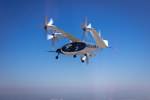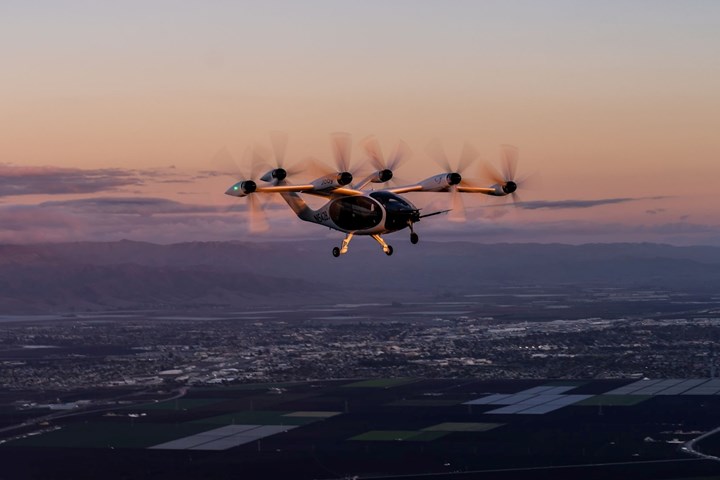Joby completes second stage of eVTOL certification process
Joby has demonstrated that its eVTOL aircraft is capable of meeting safety rules defined during the first stage, thus meeting the Means of Compliance for type certification. Progress continues in the next three stages.
Joby’s pre-production prototype aircraft in flight near the company’s manufacturing and flight testing facilities in Marina, California. Photo Credit: Joby Aircraft
All-electric aircraft developer Joby Aviation Inc. (Santa Cruz, Calif., U.S.) has completed the second of five stages required by the Federal Aviation Administration (FAA) to certify its electric vertical takeoff and landing (eVTOL) aircraft for commercial passenger use.
In the second stage of the type certification (TC) process, a company identifies the ways in which it will demonstrate it has met the regulatory intent of the safety rules (Means of Compliance) that were defined during the first stage of the process (Certification Basis).
Joby believes it is the first eVTOL company to reach this milestone, having also been one of the first to complete stage one and have its Certification Basis published in the Federal Register. Achieving this goal moves Joby one step closer to its target of launching commercial passenger service by 2025.
“Certification is an integral part of everything that an aerospace company does and with the achievement of this critical milestone, we’re now able to confidently focus our efforts on closing the remaining certification plans and completing the testing required to certify our aircraft,” says Didier Papadopoulos, head of aircraft OEM at Joby. “We’re grateful for the FAA’s dedication to the safe introduction of eVTOL technology and their commitment to supporting continued US leadership in this sector.”
Joby reports that it has also already made substantial progress in the third stage of the certification process (Certification Plans), with four area-specific certification plans (ASCPs) submitted to the FAA as of November 2022 and the company’s first equipment-level qualification test plan submitted to the FAA, enabling for-credit qualification testing to proceed. Progress also continues in stage four (Testing and Analysis) and stage five (Show and Verify). Joby provided a summary of the five stages of type certification in its Q2 2022 Shareholder Letter.
It is typical for a small portion of the Means of Compliance to remain open to enable further collaboration on minor design changes and improvements that may occur later in the certification process. With 94% of its Means of Compliance now accepted by the FAA, Joby considers the second stage essentially complete.
See “Joby completes second of four system reviews with the FAA” for more information.
Related Content
-
Carbon fiber, bionic design achieve peak performance in race-ready production vehicle
Porsche worked with Action Composites to design and manufacture an innovative carbon fiber safety cage option to lightweight one of its series race vehicles, built in a one-shot compression molding process.
-
Corebon induction heating
This sidebar to CW’s August 2024 feature article reviews this technology for more efficient composites manufacturing and why it aligns with Koridion active core molding.
-
Optimizing robotic winding of composite tanks and pipes
Pioneer in mandrel-based reinforced rubber and composite products, TANIQ offers TaniqWindPro software and robotic winding expertise for composite pressure vessels and more.

















